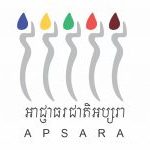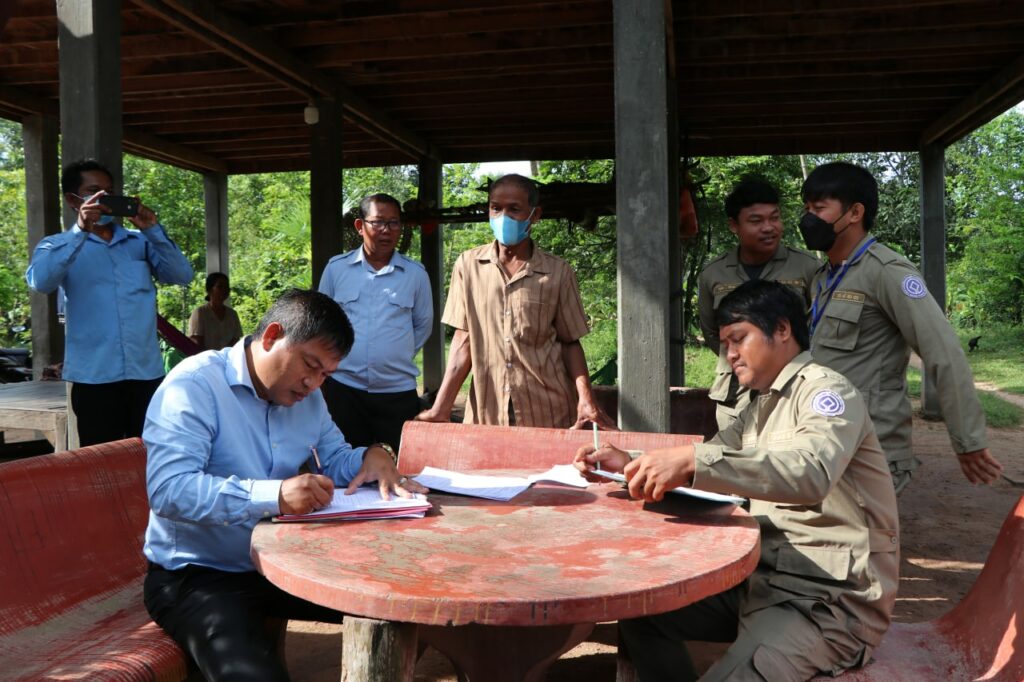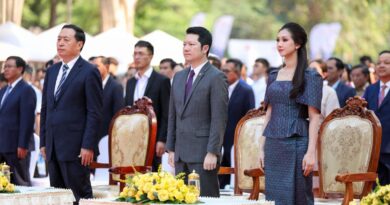យោងតាមសេចក្តីសម្រេចលេខ៧០ សសរ ស្តីពីការកំណត់បទដ្ឋាននៃការប្រើប្រាស់ដីធ្លីនៅតំបន់១ និងតំបន់២ ក្នុងតំបន់រមណីយដ្ឋានសៀមរាប-អង្គរ បានកំណត់ថា ប្រជាពលរដ្ឋដែលមានលំនៅឋាន និងរស់នៅយូរលង់ណាស់មកហើយ អាចបន្តរស់នៅតទៅទៀត ដោយមិនតម្រូវឱ្យចាកចេញពីភូមិដ្ឋានឡើយ។ អ្នកភូមិទាំងនោះ អាចរុះរើ ជួសជុលផ្ទះចាស់ ទ្រុឌទ្រោម ដើម្បីសាងសង់ផ្ទះថ្មី ជំនួសផ្ទះចាស់បាន ដោយមានការអនុញ្ញាតពីអាជ្ញាធរអប្សរា។ ក៏ប៉ុន្តែ រាល់ការសាងសង់ផ្ទះថ្មី ត្រូវហាមឃាត់ជាដាច់ខាត។
លោកឡូយ អ៊ាត អាយុ៦២ឆ្នាំ រស់នៅភូមិនគរក្រៅ សង្កាត់គោកចក ក្រុងសៀមរាបបានឱ្យដឹងថា លោករស់នៅក្នុងមូលដ្ឋាននេះជាច្រើនឆ្នាំមកហើយ ពោលគឺនៅមុនឆ្នាំ១៩៩៣ ដោយទទួលបានកេរ្តិ៍មរតកជាដីធ្លីទាំងនេះពីដូនតាមក។ លោកបន្តថា ដើមឡើយលំនៅឋានរបស់លោក មានសភាពចាស់ទ្រុឌទ្រោមយ៉ាងខ្លាំង តែលោកមិនហានដាក់ពាក្យស្នើសុំជួសជុលឡើយ ព្រោះយល់ថាអាជ្ញាធរជាតិអប្សរាមិនអនុញ្ញាត។ តែក្រោយមកលោកក៏ទទួលបានព័ត៌មានតាមការផ្សព្វផ្សាយពីក្រុមការងារសហគមន៍ថា ប្រជាពលរដ្ឋដែលរស់នៅយូរលង់ណាស់មកហើយ អាចស្នើសុំជួសជួលផ្ទះចាស់ទ្រុឌទ្រោមបាន ទើបលោកសម្រេចចិត្តដាក់ពាក្យស្នើសុំជាបន្តបន្ទាប់រហូតអាចជួសជុលលំនៅឋានរបស់លោក បានល្អប្រសើដូចសព្វថ្ងៃ។
លោកបន្តទៀតថា ថ្មីៗនេះលោកទើបទទួលបានលិខិតអនុញ្ញាតពីអាជ្ញាធរជាតិអប្សរា បន្ទាប់ពីលោកបានដាក់ពាក្យស្នើសុំ ដើម្បីតសំយាបប្រវែង៣ម៉ែត្ររៀបចំជាពីរបន្ទប់ និងចាក់សាបខាងក្រោមផ្ទះ ដើម្បីសម្រួលដល់ការរស់នៅ ព្រោះថាកូនៗដែលមានចំនួន៨នាក់ កាន់តែធំ ក៏ត្រូវរៀបចំបន្ទប់សម្រាប់ពួកគេ។
បុរសវ័យ៦២ឆ្នាំខាងលើ បានរៀបរាប់ទាំងក្តីសប្បាយរីករាយទៀតថា លោកពិតជាមានមោទនភាពយ៉ាងខ្លំាងដែលបានរស់នៅនិងអាស្រ័យផលក្នុងតំបន់រមណីយដ្ឋានអង្គរ ព្រោះថារមណីយដ្ឋានអង្គរទាំងមូលបានផ្តល់ឱ្យរូបលោក និងប្រជាពលរដ្ឋដទៃទៀត នូវប្រាក់ចំណូលពីវិស័យទេសចរមិនចេះរីងស្ងួត។
ចំណែកលោកស្រី ឈិន បូលីន អាយុ ៧១ឆ្នាំ រស់នៅ ភូមិគោកតាចាន់ សង្កាត់គោកចក បានរៀបរាប់ថា លោកស្រីបានរស់នៅក្នុងតំបន់រមណីយដ្ឋានអង្គរជាយូរឆ្នាំណាស់មកហើយ។ ចំណែកការសុំច្បាប់សាងសង់ឬជួសជុលផ្ទះ មានភាពងាយស្រួល មិនមានភាពស្មុគស្មាញអ្វីឡើយ ដោយធ្វើឡើងតាមរយៈភូមិ ឃុំ និងបន្តទៅអាជ្ញាធរជាតិអប្សរាប៉ុណ្ណោះ និងមានក្រុមការងារសហគមន៍ នៃអាជ្ញាធរជាតិអប្សរា ចុះមកពិនិត្យទៅតាមអ្វីដែលយើងបានស្នើសុំ។
លោក នង សុវណ្ណារិទ្ធ អនុប្រធានលេខាធិការដ្ឋានសហគមន៍បានឱ្យដឹងថា ប្រជាពលរដ្ឋដែលរស់នៅក្នុងតំបន់អង្គរជាយូរលង់ណាស់មកហើយ អាជ្ញាធរជាតិអប្សរា មិនបានហាមឃាត់ការជួសជុលផ្ទះសម្បែង បន្ទប់ទឹក ចង្រ្គានបាយ ឬរោងចិញ្ចឹមសត្វរបស់ពួកគាត់ឡើយ តែនៅពេលត្រូវការសាងសង់ឬជួសជួលលំនៅស្ថានរបស់ខ្លួន ពួកគាត់ត្រូវតែដាក់ពាក្យស្នើសុំមកអាជ្ញាធរជាតិអប្សរា តាមរយៈអាជ្ញាធរភូមិ ឃុំដែលនៅជិតបំផុត។ លោកបន្តថា រាល់ការដាក់ពាក្យស្នើសុំរបស់ប្រជាពលរដ្ឋមិនតម្រូវឱ្យបង់ប្រាក់ឡើយ តែពួកគាត់ត្រូវភ្ជាប់មកជាមួយនូវ៖ អត្តសញ្ញាណប័ណ្ណ សៀវភៅគ្រួសារ សៀវភៅស្នាក់នៅ លិខិតបញ្ជាក់កម្មសិទ្ធិដីធ្លីដែលមានការបញ្ជាក់ពីអាជ្ញាធរក្នុងតំបន់។
សូមបញ្ជាក់ថា៖ ៦ខែដើមឆ្នាំ២០២២នេះ ក្រុមការងារលេខាធិការដ្ឋានសហគមន៍ នៃអាជ្ញាធរជាតិអប្សរា បានចុះពិនិត្យការស្នើសុំជួសជុល និងសាងសង់តូចតាច ចំនួន៩២៧សំណើ ក្នុងនោះបានអនុញ្ញាតជូនប្រជាពលរដ្ឋបានចំនួន៦៨៣សំណើ។
សូមជម្រាបផងដែរថា យោងខ្លឹមសារសំខាន់ៗនៃបទបញ្ជាលេខ០២ ប.ប ស្តីពីការទប់ស្កាត់ និងលុបបំបាត់ អំពើអនាធិបតេយ្យនៅតំបន់រមណីយដ្ឋានអង្គរ ខេត្តសៀមរាប បានកំណត់ថា៖ អាជ្ញាធរជាតិអប្សរា ជាស្ថាប័នផ្តាច់មុខក្នុងការចេញលិខិតអនុញ្ញាតសាងសង់សម្រាប់ការស្ថាបនាទាំងឡាយក្នុងរង្វង់តំបន់រមណីយដ្ឋានអង្គរ។ សំណង់ដែលបានសាងសង់រួច ដោយគ្មានច្បាប់អនុញ្ញាត ត្រូវរុះរើចេញវិញ។
អាជ្ញាធរជាតិអប្សរា ត្រូវសហការជាមួយអាជ្ញាធរដែនដី និងសមត្ថកិច្ចពាក់ព័ន្ធ ដើម្បីចាត់ការអនុវត្តជាបន្ទាន់បំផុត នូវការចុះស្រង់ស្ថិតិឈ្មោះជនល្មើស និងទីតាំងនីយមួយៗឱ្យបានច្បាស់លាស់ រួចកសាងសំណុំរឿងបញ្ជូនទៅតុលាការដើម្បីកាត់ទោសតាមច្បាប់ជាធរមាន និងត្រូវទប់ស្កាត់មិនឱ្យមានអំពើអនាធិបតេយ្យ កើតឡើងជាថ្មីនៅតំបន់ទាំងពីរនេះតទៅទៀតឡើយ។
នោះដែរដើម្បីសំដែននូវការលើកទឹកចិត្តដល់ប្រជាពលរដ្ឋ ដែលបានចូលរួមគោរពច្បាប់ ក្នុងការស្នើសុំច្បាប់ជួសជុល និងសាងសង់ផ្ទះ កន្លងមកអាជ្ញាធរជាតិអប្សរា ក៏ធ្លាប់បានផ្តល់ប័ណ្ណសរសើរ ដល់ប្រជាពលរដ្ឋដែលបានសាងសង់ផ្ទះខ្មែរស្របទៅតាមប្លង់ស្ថាបត្យកម្មដែលអាជ្ញាធរជាតិអប្សរាប្រគល់ជូន៕
អត្ថបទ៖នាយកដ្ឋានផ្សព្វផ្សាយ
រូបភាព៖លោក យី សុថា
Residents’ participation in construction at the Angkor site
According to Decision 70/SSR on Setting Standards of Land Use in Zone 1 and 2 of the Siem Reap-Angkor, it is determined that people who have been living at the site for a long time, can continue to live without being required to leave the village. The villagers can dismantle and renovate old houses with the permission of the APSARA National Authority. However, the construction of new houses is strictly prohibited.
Loy At, 62, a resident of Nokor Krao village, Kork Chak commune, Siem Reap city, said he had lived in the area for many years, before 1993, inheriting the land from his ancestors. He said that initially, his house was very old and dilapidated, but he did not dare to apply for repairs because he understood that the APSARA National Authority did not allow it. But later, he also received information from the community working group that people who have lived on the site for a long time could apply for the renovation of dilapidated houses, so he decided to apply for permits until the house could be repaired today.
He added that he recently received a permit from the APSARA National Authority after he applied for home renovation to make the two rooms for his eight children.
The 62-year-old man said happily that he was very proud to live in the Angkor area because the whole Angkor site provided him and other villagers with income from Tourism.
Chhin Bolin, 71, of Kork Ta Chan village, Kork Chak commune, described that she had lived in the Angkor area for many years. Applying for a permit to build or renovate a house is easy and not complicated. It is done through the village/commune chief, and then the APSARA National Authority’s community working group came to check according to our request.
Nong Sovannarith, Deputy Director of the Community Secretariat, said that people who have been living in the Angkor area for a long time had not been banned by the APSARA National Authority from renovating their houses, bathrooms, kitchens, or livestock sheds when needed. Still, they must apply to the APSARA through the nearest village or commune authority. He said that all applications of citizens do not require payment, but they must bring: an ID card, family book, residence book, and certificate of land ownership with a certificate from the local authority.
It should be noted that: In the first 6 months of 2022, the working group of APSARA National Authority inspected 927 requests for minor construction, of which 683 requests were granted permits.
According to the main content of Regulation No. 02/BB on the Prevention and Elimination of illegal construction in the Angkor site, Siem Reap Province, it is determined that: APSARA National Authority is the only institution in issuing construction permits for all constructions in the Angkor site. Constructions built without permission must be demolished.
APSARA National Authority must cooperate with the local authority and relevant authorities to take immediate action to compile statistics on the names of the perpetrators and locations, and a case to be sent to court for trial following the law in force to prevent illegal constructions in these two zones.
In addition, to encourage the residents who have respected the law of home renovation, APSARA has also given certificates of appreciation to the residents who built Khmer houses following the architectural plan—presented by APSARA National Authority.
Article: Department of Communication
Photos: Yi Sotha





